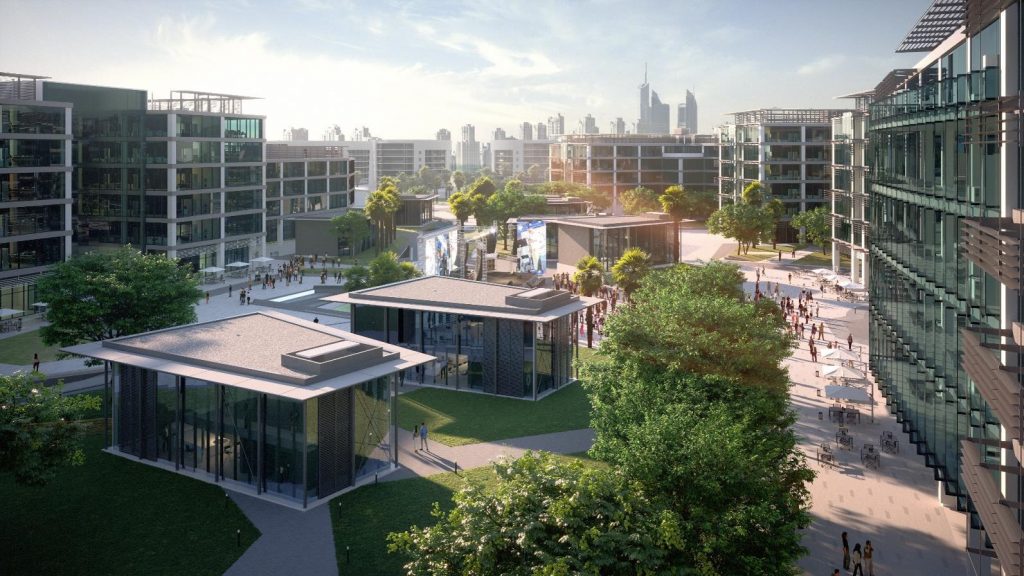TECOM Group has broken ground on the Innovation Hub Phase 2 in Dubai Internet City, as Dubai’s legislative framework and ease of doing business attract a high volume of international companies and investors. The Group is expanding its leasing portfolio to capture the increasing demand in Dubai’s commercial real estate market underpinned by the emirate’s economic development and the government’s pro-growth strategies.
The AED442 million new investment underscores TECOM Group’s commitment to expanding and tailoring its portfolio to emerging sector needs and attracting global companies. It will offer customers high-quality commercial office properties, state-of-the-art office spaces and HQs tailored to customer specifications.
Abdulla Belhoul, Chief Executive Officer of TECOM Group, said: “TECOM Group remains a pillar for Dubai’s business hub proposition. New regulatory frameworks and the ease of doing business are accelerating economic growth and reinforcing investor and business confidence. We’re seeing the success of our leadership’s economic diversification strategy reflected in our commercial and industrial real estate portfolio performance this year due to an influx of new companies and talent.
“Across our portfolio, existing customers are expanding their operations, complemented by an inflow of new foreign investment. Bespoke solutions like the Innovation Hub address the need for high-quality commercial spaces, helping strengthen Dubai’s position as an attractive global business and talent hub. It also cements TECOM Group as the emirate’s largest commercial real estate owner and our key role in driving innovation and business growth development in Dubai.”
TECOM Group’s Q3 2022 financial performance reflected the upward trend in the commercial real estate market. Revenue came in at AED 490 million, increasing 12.48% year on year (YoY), driven by rising occupancy levels across the portfolio, especially office, warehouse, and worker accommodation.
The Innovation Hub Phase 2 expands TECOM Group’s assets with two high-end office buildings, four boutique offices, retail spaces and more than 800 parking spaces. To be completed by 2024, the Innovation Hub Phase 2 will provide more than 355,000 square feet of gross leasable area (GLA).
Launched in 2018, the first phase of the Innovation Hub is almost at full capacity, providing tech giants like Google, Hewlett-Packard, Gartner and China Telecom a base in the region. With additional stages in the pipeline, the completed Innovation Hub project is expected to add more than 1.2 million square feet of space for technology, education and new media businesses of all sizes to the Group’s portfolio.
TECOM Group has cultivated a global business and technology hub under Dubai Internet City. Today, it represents a complete community of Fortune 500 companies, SMEs, start-ups and entrepreneurs. Recent additions include Motorola Solutions and Intel, while longstanding customers 3M, Visa and Meta upgraded to new headquarters this past year. Dubai Internet City also features over 15 innovation centres powered by customers like Visa, MasterCard, SAP, Google and 3M, which are promoting digital transformation region-wide.
Commenting on behalf of Dubai Internet City, Ammar Al Malik, Executive Vice President – Commercial Leasing, TECOM Group PJSC, said: “Dubai’s pursuit of a knowledge and innovation economy relies on a robust technology framework. For more than 20 years, Dubai Internet City has provided the necessary infrastructure and environment where the complete tech community can converge. Ready-to-use facilities like our Innovation Hub enable customers to hit the ground running. Expanding our district’s commercial offering to cater to the Emirate’s growing business appetite will enrich our global community with innovation-driven brands and talent.”
According to the CORE Dubai Market Report Q3 2022, the Emirate is seeing growth in new licenses and residents, boosting demand in the commercial leasing sector. The report also found that citywide office occupancy levels are the highest since the peak in 2014, up to 83% in Q3 compared to 78% last year.

